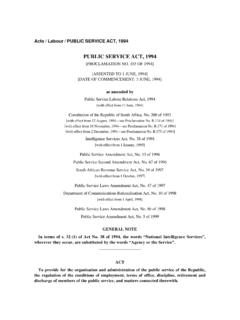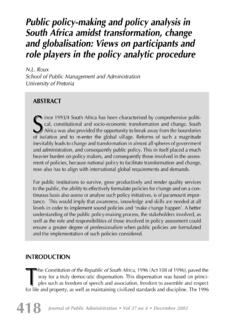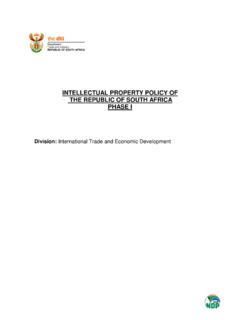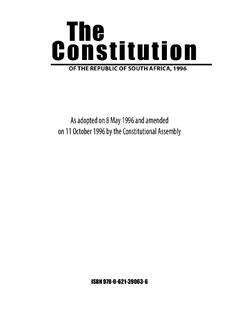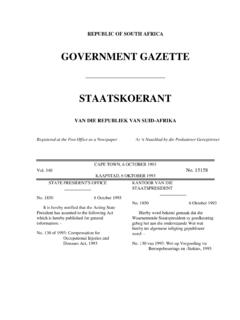Transcription of THE LABOUR COURT OF SOUTH AFRICA, JOHANNESBURG …
1 republic OF SOUTH africa Reportable Of interest to other judges THE LABOUR COURT OF SOUTH africa , JOHANNESBURG JUDGMENT Case no: J 1744/11 In the matter between: NW MASHIYA Applicant and ADV I SIRKHOT First respondent THE MINISTER OF CORRECTIONAL SERVICES Second respondent THE NATIONAL COMMISSIONER OF CORRECTIONAL SERVICES Third respondent Heard: 29 August 2011 Delivered: 30 August 2011 Summary: Application to interdict disciplinary hearing recusal of chairperson 2 JUDGMENT STEENKAMP J Introduction [1] This is an application to order that the chairperson of a disciplinary hearing, due to commence at 0900 today, 30 August 2011, must recuse himself from the hearing; and interdicting the respondents from proceeding with the hearing today or on any other date under the chairmanship of the first respondent, Adv I Sirkhot.
2 The applicant further seeks an order that the respondents must agree to another independently appointed arbitrator from the relevant sectoral bargaining council. [2] The application was brought on an urgent basis and the hearing before me was concluded at 1700 on Monday 29 August 2011. At the request of the applicant I did not give an ex tempore judgment but indicated that I would hand down judgment at 0800 the next morning, 30 August 2011. Due to the urgency of the matter and the time constraints I will provide only brief reasons for my findings. Background [3] The applicant is the Area Commissioner for Leeuwkop Prison, employed by the Department of Correctional Services. The first applicant is Adv Imthiaz Sirkhot, a legal practitioner who is cited in his nominal capacity as the appointed chairperson in a disciplinary hearing.
3 The second and third respondents are the Minister and the National Commissioner, respectively, of Correctional Services. [4] The applicant has been accused of various instances of serious misconduct involving dishonesty. It is common cause that, should he be found to have committed the alleged acts, he may well be dismissed. [5] The applicant, as a senior employee in the public service, falls within the auspices of the Senior Management Service Handbook (SMS Handbook) and the provisions concerning discipline contained therein. In terms of clause (3)(b) of the Handbook: 3 The employer must appoint a person, from within or outside the public service, as chairperson of the disciplinary hearing. [6] Adv Sirkhot, a person from outside the public service, was appointed to chair the applicant s disciplinary hearing.
4 [7] And in terms of subclause (e): In a disciplinary hearing, neither the employer nor the member may be represented by a legal practitioner, unless the member is a legal practitioner. [8] Despite the clear wording of this clause, the applicant applied for legal representation when the disciplinary hearing was due to commence on 14 July 2011. On that day, the parties agreed that the hearing would proceed on 8, 23 and 30 August 2011. On 25 July 2011, Adv Sirkhot declined the application. I will return to that aspect later. [9] On 5 August 2011 the applicant brought an application to review the chairperson s ruling on legal representation. That application was brought in the normal course and not on an expedited basis. Nevertheless, in terms of prayer 2 of that application, the applicant sought an order to halt the internal hearing.
5 [10] On 8 August the applicant, represented by a union representative, sought and was granted a postponement to enable his chosen union representative to represent him at the next sitting on 23 August. Although the applicant s counsel, Mr Ndziba, argued that the applicant s representative also sought the chairperson to recuse himself on 8 August, no such application is clear from the transcript of the proceedings. [11] On 19 August, 11 days later, the applicant brought an urgent application before this COURT [per Bhoola J] asking for the following relief: Declaring that there was malice and bias on the part of the first respondent in its ruling no to permit the applicant legal representation at the disciplinary hearing; Interdicting, prohibiting and/or restraining the respondents from proceeding with the disciplinary hearing of the applicant on 23rd and 30th August 2011; Ordering the second and third respondents to agree to an independently appointed arbitrator from the relevant sectoral bargaining council appointed by the Council in terms of the provisions of clause (5) of the SMS Disciplinary Code and Procedures (Chapter 7 of the SMS Handbook).
6 4 [12] On the day of the hearing on 19 August, the application was removed from the roll at the applicant s request to enable him to amend his papers. He tendered costs. [13] This application was launched a week later, on 26 August 2011. Urgency [14] The application, comprising more than 400 pages, was delivered at 16:00 on Friday 26 August to be heard at 10:00 on Monday 29 August. [15] The main cause for this application is the applicant s purported apprehension of bias on the side of the chairperson. The applicant first attended his disciplinary hearing on 14 July 2011, a month and a half ago. He did not raise any apprehension of bias then. Mr Ndziba, for the applicant, says that is because the apprehension was only triggered by the refusal to grant legal representation on 25 July 2011.
7 But that is in itself more than a month ago. The reason for the delay, says Mr Ndziba, is that it is only on 19 August, when the previous urgent application was brought before Bhoola J, that he and the applicant realised from the respondents answering affidavit in that application that the actual relief sought ie to order Adv Sirkhot to recuse himself was not clear and that, therefore, the applicant had to amend his papers. Yet he does not explain why it took him a week to do that, and then expected the respondents to respond to a voluminous new application over the weekend. [16] Even if one accepts that this application was triggered only by the ruling on 25 July, and could not have been brought in the period between 14 and 25 July, it is entirely self-created. The purported cause of action was clear from 25 July; the applicant (and his legal representatives) only have themselves to blame for couching the relief sought in the wrong terms in their first application of 19 August.
8 And even then the delay from 25 July to 19 August is not adequately explained. The applicant says he consulted his attorneys of record on 8 August 2011 (and his counsel has been assisting him since at least the commencement of the hearing on 14 July); there is no explanation for the delay in bringing this application (and the one on 19 August) on such short notice. 5 [17] Rule 8 requires that the applicant sets out in his founding affidavit the reasons for urgent This was not adequately done in this case. On that basis alone, the application should be dismissed or removed from the roll. I have nevertheless heard full argument on the merits and will deal with it. Application premature? [18] The disciplinary hearing has commenced and some witnesses have already been called.
9 The chairperson has ruled on legal representation (on 25 July) and on the application for his recusal (on 23 August). It would be premature for this COURT to order the chairperson to recuse himself where his ruling on that regard has not been taken on review and the hearing is midstream. Prima facie right? [19] The applicant submits that he has a clear right to the relief sought. With regard to the recusal of the chairperson the relief sought is final in nature, which is presumably why he doesn t rely on a prima facie right only. [20] The right he asserts is the right to a fair trial. He submits that, absent the relief sought, he will be denied that right as the chairperson is biased and refused to recuse himself. [21] In order to inquire into the question whether the applicant will be denied that right, then, the COURT has to consider whether the applicant has a reasonable apprehension of bias on the part of the chairperson.
10 [22] The test for recusal in judicial proceedings and the parties are ad idem that the same should apply in the disciplinary hearing is that the applicant has to show that he entertains an apprehension of bias on the part of the presiding officer; and that the apprehension is 1 Jiba v Minister: Dept of Justice & Constitutional Development & Others (2010) 31 ILJ 112 (LC) para [18]. 2 SACCAWU 7 others v Irvin & Johnson Ltd (2000) 21 ILJ 330 (LAC) para [25]. 6 [23] The Constitutional COURT recently formulated the test thus in Bernert v ABSA Bank Ltd3: The test for recusal which this COURT has adopted is whether there is a reasonable apprehension of bias, in the mind of a reasonable litigant in possession of all the relevant facts, that a judicial officer might not bring an impartial and unprejudiced mind to bear on the resolution of the dispute before the COURT .










